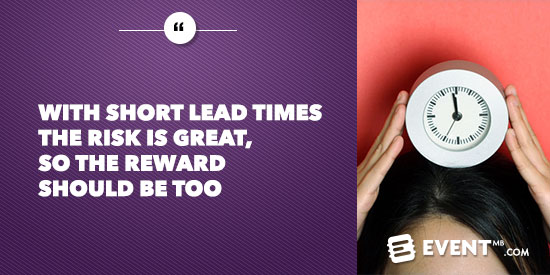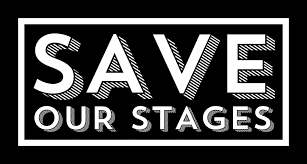Event lead times are getting shorter. How do you cope with them and where can event planners cut corners when time is running out?
Event planners make a name for themselves on their ability to exceed client expectations. Sometimes taking on an event with a short lead time is a good way to impress a new client or retain a current one. However, if you fail to deliver on an event you’ll do more damage to your business than simply turning it down in the first place.
How do you know what lead time is too short? What time saving hacks can you use to cut corners? How do you cope with the stress and when is it better to turn a client down? Finding the answers to these questions will help you take your event business from average to awesome.
Know Who’s a Good Fit
All clients aren’t created equally. There is no reason to accept a gig with a short lead time for a client that’s not a great fit for your business. Be choosey. Work only with people who fit your business model, regardless of event lead time.
How Short is Too Short?
image: http://www.eventmanagerblog.com/wp-content/uploads/2016/06/11-Easy-Strategies-to-Meet-Event-Deadlines-Q1.jpg
 The answer to this depends largely on the type and size of the event you’re organizing. How many moving pieces are there? What are you coordinating? How much of it depends on you and your actions and what hinges on other vendors? Larger events with more moving pieces require more time. Ashleigh Dorfman from Posh Productions gives some planning timeline ideas here. Remember, if you’re working with multiple vendors, particularly ones you haven’t worked with before, short lead times can be much more stressful because you must rely on others and you don’t have the team flow that you would with your regular group.
The answer to this depends largely on the type and size of the event you’re organizing. How many moving pieces are there? What are you coordinating? How much of it depends on you and your actions and what hinges on other vendors? Larger events with more moving pieces require more time. Ashleigh Dorfman from Posh Productions gives some planning timeline ideas here. Remember, if you’re working with multiple vendors, particularly ones you haven’t worked with before, short lead times can be much more stressful because you must rely on others and you don’t have the team flow that you would with your regular group.
Before agreeing to any event with a less than ideal lead time, understand what is required of you, what you’re in control of, and what the event means to your career. With short lead times, the risk is great so the reward should be too.
Making the Most of Every Moment
Once you’ve decided this client is someone you want to work with and the event is one that’s worth the challenge, you’ll want to make the most of every minute you have. Event professionals know the key to turning around a quick event is in your ability to tap resources and implement time-saving tips. Here are some of the best to get the most accomplished in the least amount of time.
Write It all Down
You can’t afford to waste any time so make sure you are clear on all of the components. Create a to-do list that works for you. Whether you’re a paper person, a whiteboard fanatic, part of the stickie note club, or prefer it all organized electronically, getting it organized visually is critical to getting it done for several reasons:
- You are clear about what needs to be completed and what has already been done
- You can see what is in your hands and what parts you’re waiting on someone else for
- It marks your progress and gives you a feeling of accomplishment, which will help with managing the stress of a tight timeframe
Use People You Know
If you have a say in who helps you put the event together, use people you know you can count on. This is not the time to audition an unknown entity.
image: http://www.eventmanagerblog.com/wp-content/uploads/2016/06/11-Easy-Strategies-to-Meet-Event-Deadlines-Q2.jpg

Know You’re Only Guaranteed Today
The day you have the clearest view of is today. When you have a short lead time on an event you don’t want to put anything off for another day. As Veronica Shofstall wrote in her poem After a While, “you learn to build all your roads on today because tomorrow’s ground is too uncertain for plans, and futures have a way of falling down in mid-flight.” Do it now. It’s the only guarantee you have.
Attend to Basics First
Don’t waste time dreaming about the icing and decorations without having your cake baked. When organizing an event on a tight deadline, attend to the basics first; the “icing” can wait for later. When compiling your to-do list organize it like you would a recipe, in logical steps. That way you tend to the most important things first, and get to the extras later.
image: http://www.eventmanagerblog.com/wp-content/uploads/2016/06/11-Easy-Strategies-to-Meet-Event-Deadlines-Q3.jpg

Use Your CVB
The CVB has a lot of pull when it comes to getting answers. If you feel like you’re chasing around venue managers and other vendors, ask the CVB to help. They’re able to do so for free and when they call, most vendors answer.
Build a Team Before You Need One
This tip allows you to do what other event planners can’t – put together an event in the shortest period of time. When you have a tight group of event vendors you work with regularly, you don’t need to make calls about budgets and details. Assemble an event team and agree on pricing and services. This allows you to put together a quick quote without waiting on return calls.
Nail Down Details ASAP
Get the client to commit to as many details as possible as early as possible. Mind map it if you have to, asking questions like, “If we can’t do this, then what is your second choice?” This works particularly well when selecting a date or a venue. Mapping out option flow will save you the headache of going back and forth with a lot of date and location questions. The more questions you have later; the more time you’ll waste.
Educate on Expectations
Make sure you set expectations early. If you have a concern raise it. If you know something needs to be cut due to limited time, tell them early. Don’t leave any surprises. Many times clients feel guilty or uneasy about short time lines. They’re willing to make concessions if they know about them early on. What clients don’t like is surprises.
In Conclusion
With the growing popularity of pop-up events and the increase of time involved in budgetary sign-offs, event planners are feeling the squeeze with diminishing lead times. Just as your clients are looking for a return on their investment, you need to be looking at a return for your time as well, and it should be something larger than a paycheck. An event with a short lead time will bring with it added pressure and stress, and may affect your ability to meet the needs of your other clients. Make sure the client fits your ideal client persona and there’s a reason to take on the challenge outside of “paying the bills.” If not, you’d be wise to leave it behind.
image: http://www.eventmanagerblog.com/wp-content/uploads/2015/09/Christina-138×138.png
Read more at http://www.eventmanagerblog.com/meeting-event-deadlines#j15agOgH6EYcuHge.99





















